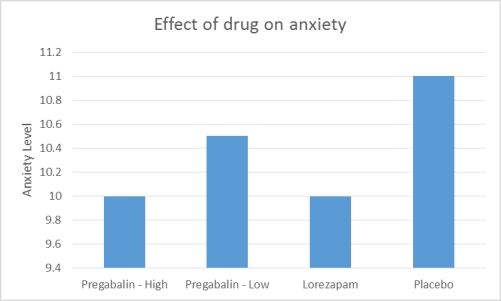Use the following to answer questions
Scenario I
Scenario I is based on fabricated data inspired by the following study:
Pande, A. C., Crockatt, J. C., Feltner, D. E., et al. (2003) . Pregabalin in generalized anxiety disorder: a placebo-controlled trial. The American Journal of Psychiatry, 160(3) , 533-540.
Effect of Pregabalin on Anxiety
Pande and colleagues examined whether pregabalin (brand name Lyrica) was as effective as lorazepam (brand name Ativan) in treating anxiety. To that end, they administered either a low dose of pregabalin, a high dose of pregabalin, lorazepam, or placebo to participants for four weeks, then measured the participants' anxiety using the Hamilton Anxiety Rating Scale. The researchers found that not only did the high dose of pregabalin significantly reduce anxiety, but that it also reduced anxiety as well as lorazepam. The results of the study (Figure 1) indicate that pregabalin may be an effective alternative to lorazepam to treat anxiety in adults.
 Figure 1. Hypothetical results of Pande et al (2003) showing the impact of each treatment on anxiety level. Anxiety was measured using the Hamilton Anxiety Rating Scale.
Figure 1. Hypothetical results of Pande et al (2003) showing the impact of each treatment on anxiety level. Anxiety was measured using the Hamilton Anxiety Rating Scale.
-(Scenario I) Which of the following is an ethical issue apparent in Figure 1?
Definitions:
Unwritten Policies
Rules or guidelines that are understood and followed within an organization or community but are not formally documented.
Personal Policy
Individual rules or guidelines that a person sets for themselves in order to achieve personal goals.
Job Training
involves programs and courses designed to equip individuals with the skills and knowledge necessary for employment in specific industries.
Opportunity-Enhancing
Activities or policies designed to increase the chances for success or advancement for individuals or organizations.
Q4: If a research question requires the researcher
Q5: Kaila is interested in studying whether participation
Q13: The fact that researchers must be mindful
Q14: Why might a researcher choose to use
Q24: An example of a database where psychologists
Q45: Researchers may fail to use simple random
Q58: Adult is the child as:<br>A) consent is
Q65: What is a hypothesis?<br>A) an educated prediction
Q87: The difference between conversation analysis and content
Q92: Mrs.Sommer and Dr.Elston are researching eating habits